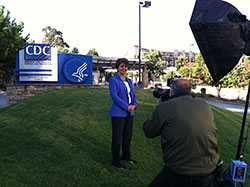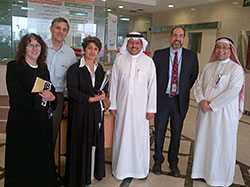Awards, MERS Support
Division of Bacterial Diseases (DBD) News Bulletin - Fall 2014
This website is archived for historical purposes and is no longer being maintained or updated.
November 7, 2014: Content on this page kept for historical reasons.
In This Issue
Awards

Photo: Rana Hajjeh being photographed for the 2014 Samuel J. Heyman Service to America Medals.
DBD Director Named Federal Employee of the Year for 2014
Rana Hajjeh, DBD director and former director of the GAVI Hib Initiative, was awarded the Federal Employee of the Year Medal for leading the Hib Initiative, which is estimated to save the lives of millions of children by 2020. The award was presented on September 22 at the thirteenth annual gala of the Samuel J. Heyman Service to America Medals in Washington, D.C. Hajjeh was recognized for leading the global campaign, with partners at the World Health Organization, Johns Hopkins School of Public Health, and the London School of Hygiene and Tropic Medicine. The Hib Iniatiative provided compelling evidence to convince some of the world’s poorest countries to use the Hib vaccine to fight bacterial meningitis, and pneumonia. Learn more.
CDC & ATSDR Honor Awards
The 62nd Annual CDC & ATSDR Honor Awards Ceremony was held in May. MVPDB’s Fabien Diomande, who was a secondee to Burkina Faso at the time, won the Excellence in Frontline Public Health Service award for exemplary commitment and contributions towards the elimination of epidemic meningitis in Africa. The MenB Outbreak Response Team won a group award in Excellence in Public Health Protection. This multi-center team was honored for their exemplary leadership and support of CDC’s response to MenB outbreaks in 2013. The Antibiotic Resistance Threat Report Team, comprised of staff from multiple centers, won the Excellence in Communications group award for its development of the first comprehensive report on antibiotic resistance.

Photo: Bernard Beall, team lead, Streptococcus Laboratory
Fellowship in the American Academy of Microbiology
RBD’s Bernard Beall was elected to the Fellowship in the American Academy of Microbiology. Fellows of the Academy are elected annually through a highly selective, peer-review process, based on their records of scientific achievement and original contributions that have advanced microbiology. There are over 2,400 Fellows representing all subspecialties of microbiology, including basic and applied research, teaching, public health, industry, and government service. View Beall’s profile.
S-Lab Awards for Laboratory Improvement and Innovation
S-Lab (Safe, Successful and Sustainable Laboratories) aims to create more sustainable laboratories, and to raise sustainability awareness among lab-using staff and students. It is a project of the Higher Education Environmental Performance Improvement, which is now based at the Institute of Science and Technology. DBD’s Microbial Pathogenesis and Immune Response (MPIR) Laboratory’s efforts to win CDC’s 2012 Freezer Challenge earned the recognition of highly commended for the 2014 S-Lab Awards. Read more about the MPIR Laboratory’s Efforts to reduce energy use, cut operating costs, adopt innovative laboratory sustainability practices, and leverage existing storage capacity without the need for new equipment or space.
Charles C. Shepard Science Award
Adam Cohen, a former RDB epidemiologist, won the prestigious 2014 Charles C. Shepard Science Award for a published paper he co-authored: “Impact of Introduction of the Haemophilus influenzae Type b Conjugate Vaccine into Childhood Immunization on Meningitis in Bangladeshi Infants.” This study was supported by the GAVI’s Hib Initiative. This award recognizes excellence in scientific achievement by CDC and ATSDR authors of outstanding scientific papers and honors the memory of Charles C. Shepard whose career was marked by the pursuit of scientific excellence.
DBD Supports MERS Response
On May 2, 2014, the first U.S. imported case of Middle East Respiratory Syndrome (MERS) was confirmed in a traveler from Saudi Arabia to the United States. On May 11, 2014, a second U.S. imported case of MERS was confirmed in a traveler also from Saudi Arabia. The two U.S. cases are not linked. So far, all MERS cases have been linked to countries in or near the Arabian Peninsula.

The infection is caused by a coronavirus called MERS-CoV. Most people confirmed to have MERS-CoV infection have had severe acute respiratory illness. About 30% of people confirmed to have MERS-CoV infection have died. The virus has spread from ill people to others through close contact, such as caring for or living with an infected person. However, there is no evidence of sustained spread in community settings.
CDC continues to closely monitor the MERS situation globally and work with partners to better understand the risks of this virus, including the source, how it spreads, and how infections might be prevented. CDC recognizes the potential for MERS-CoV to spread further and cause more cases globally and in the United States. CDC has provided information for travelers and is working with health departments, hospitals, and other partners to prepare for this.
Several staff from DBD recently supported the agency’s MERS response effort including Bernard Wolff, Lindsay Kim, Sarah Meyer, and Rana Hajjeh. In 2013, Chris Van Beneden, Elizabeth Briere, Gayle Langley, Kathleen Dooling, Manisha Patel, and Preeta Kutty supported the response.
Photo: At King Fahd Med Center, Jeddah, Kingdom of Saudi Arabia during the MERS response. From left to Right: Deborah Hastings (CDC, EIS Officer), Jerome Tokars (Associate Director for Science, CDC’s Influenza Division), Rana Hajjeh (Director, CDC’s Division of Bacterial Diseases), Imad AlJahdaly (Director, King Fahd Med Center), David Kuhar (Medical Epidemiologist, CDC’s Division of Healthcare Quality Promotion), and Mohammad Garout (Deputy Director, King Fahd Med Center).
- Page last reviewed: November 7, 2014 (archived document)
- Content source:


 ShareCompartir
ShareCompartir